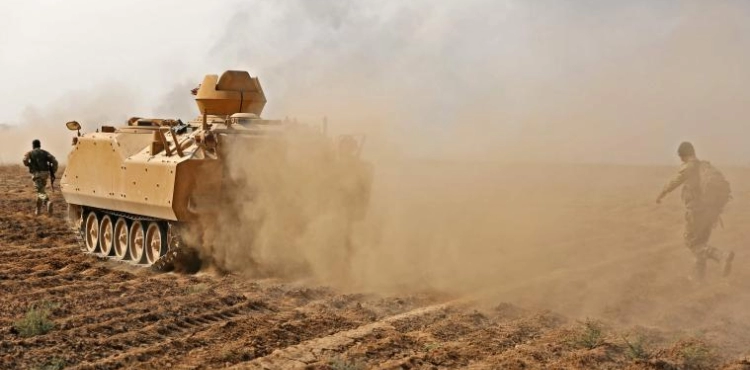Syrian Democratic Forces are engaged in fierce clashes on Friday against Turkish troops and pro-Syrian factions in an attempt to repel an attack launched by Ankara two days ago and forcing tens of thousands of civilians to flee northeastern Syria. .
Fierce clashes have been taking place since morning as the SDF tried to counter the advance of Turkish forces and their pro-Syrian factions, which are launching attacks on several fronts in the border strip from Ras al-Ain (Hasakeh) to Tal Abyad (Raqqa).
The clashes coincide with heavy artillery shelling and sporadic Turkish raids, according to the Syrian Observatory for Human Rights, which noted that the SDF used "tunnels and fortifications built near the border to launch counter-attacks and obstruct the advancement" of its opponents.
A source in the Syrian Democratic Forces from inside the town of Ras al-Ain told AFP by telephone, "Turkish forces are trying to attack from several axes to break our defense lines, but our forces are addressing them."
An AFP correspondent in the Ras al-Ain area heard the sound of bursts and artillery shelling along with the flight.
The observatory counted the deaths of seven civilians and nine members of the Syrian Democratic Forces by Turkish fire on Friday, bringing the death toll since Wednesday to 17 civilians and 41 fighters in the Syrian Democratic Forces.
Ankara on Friday announced the killing of four Turkish soldiers and wounding several others in the framework of the military operation, according to the authorities and the media.
The Turkish Defense Ministry said the military operation was "going as planned."
The day after the Turkish army and the factions took control of 11 border villages, the SDF managed to regain control of two villages at night.
The area extending from Ras al-Ain to Tal Abyad along more than 100 kilometers is predominantly Arab, unlike other Kurdish-dominated border areas.
According to Abdul Rahman, dozens of Arab residents in the area began fighting with Turkish forces immediately after the attack.
A media center linked to the Kurdish self-administration quoted a Kurdish source that some Arab tribes lined up alongside Turkish forces and moved sleeper cells to attack Syria´s democratic forces.
As a result of the escalation, entire border towns are virtually empty. An AFP correspondent on Friday saw dozens of displaced people arriving in the town of Tal Tamr, which is gradually overcrowded.
"We are here with no food, no drinks, no mattresses, we have no sleep on them," Riad Ahmed, 56, told AFP.
The man and his family took refuge in the basement of a building under construction, except for carpets and sheets provided by neighbors. "Will we stay like this on the streets as winter approaches?" He asked.
MSF expressed concern over the fate of civilians, warning that the escalation "will exacerbate the shocks suffered by the Syrians during years of war and live in precarious conditions."
A hospital in Tel Abyad, which was supported by the organization, closed because most medical staff left with their families.
The self-administration announced that it will evacuate on Friday Mabrouka camp for displaced people, located 12 kilometers from the border and looking for an alternative site to the camp of Issa, to protect 20,000 displaced people in the two sites from Turkish bombing.
Turkey has called the attack a "spring of peace" and says it aims to create a 30-kilometer buffer zone to return a large part of the 3.6 million Syrians who have taken refuge in its territory.
Russia on Friday joined the list of Western and European countries in particular, which warned that the Turkish attack could help revive the Islamic State, which is still active through sleeper cells despite its field defeat by the Syrian democratic forces.
Russian President Vladimir Putin warned on Friday that thousands of fighters of the extremist group held by the Kurds could regain their freedom. "It´s a real threat," he said.
Guardians of the Hul camp in northeastern Syria on Friday thwarted riots by women from the families of ISIS fighters, Kurdish officials said.
The SDF has repeatedly reiterated its fear that its involvement in fighting Turkish forces could negatively affect its efforts to maintain security in detention centers and camps, as well as in pursuing sleeper cells of the Islamic State.
In the city of Qamishli, three civilians were killed in a car bomb attack near a crowded restaurant, according to Kurdish security forces that have blamed the Islamic State.
France called on the international coalition led by Washington to hold an urgent meeting as "the battle against ISIS can resume."
This is the third attack by Turkey with pro-Syrian factions in northern Syria, after the first attack in 2016, which took control of several border cities, and the second in 2018, which took control of the Kurdish region of Afrin.












